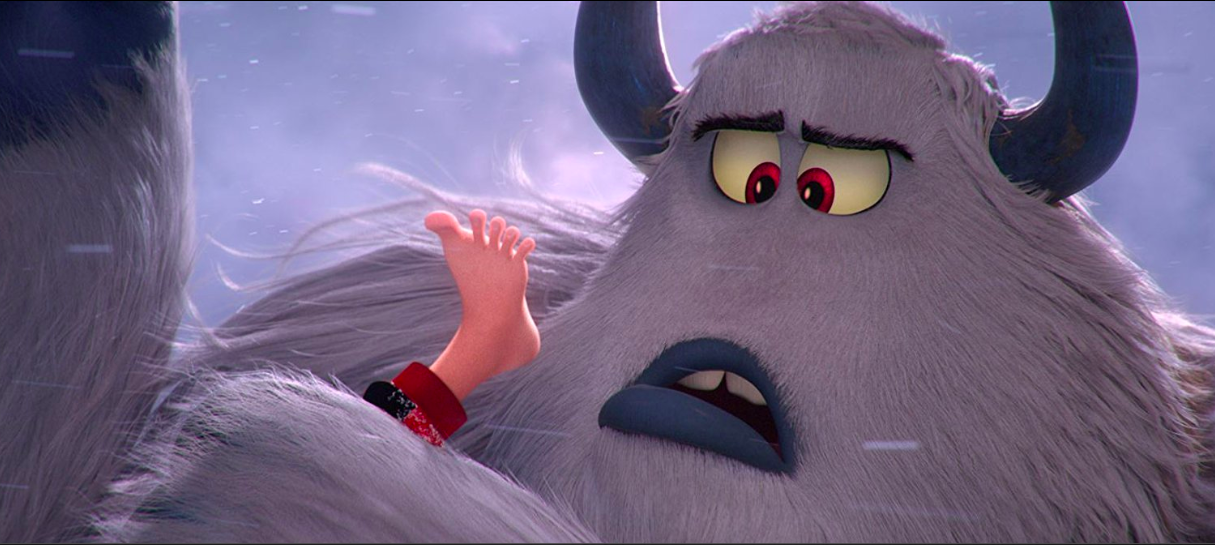At a time when it seems that most kids’ movies are either remakes of the classics or sequels, Smallfoot brings something new to the table. Directed by Karey Kirkpatrick and Jason Reisig, the animated film conveys a joyful yet profound tone, and captures the silly essence of a Warner Bros movie. The story follows the journey of Migo (Channing Tatum), a curious yeti who lives in a complex society above the clouds in the Himalayas. In this adorable village of bigfeet, the community performs seemingly pointless chores, as ordered by the Stonekeeper (Common) who possesses the power of ancient stones that must never be questioned. Upon the spectacular discovery of a mystical “smallfoot”—a human—Migo’s world turns upside down. Through a reversal of perspective, the audience observes how the tumultuous relationship between humans and yetis plays out. Unfortunately, the film sometimes misses the mark with character development and fails at an attempt to seem more musical. Nevertheless, at the heart of Smallfoot lies the empowering, impactful message of searching for the truth and accepting those who are different from ourselves.
From childhood, Migo has been set on fulfilling the job of his father, Dorgle (Danny DeVito), as gong-ringer, yet a freak plane crash catalyzes a series of events that put Migo’s life on a new path. Migo witnesses a human being ejected from the plane, but he is unable to convince his fellow yetis that the smallfeet exist since both the plane and human fall off the face of the mountain. For hundreds of years, the yetis have trusted in a set of stones that dictate the laws of the universe, such as the assertion that nothing exists beneath the clouds encircling their village. Thus, Migo faces banishment from the village for disobeying the stones, and he stumbles upon the SES, or Smallfoot Evidentiary Society, in the wilderness. Headed by the Stonekeeper’s rebellious daughter, Meechee (Zendaya), the group of misfits seek to help Migo prove the existence of the smallfeet. Although Meechee serves a pivotal role and develops as an inspirational woman character, the other members of SES—Gwangi (LeBron James), Kolka (Gina Rodriguez), and Fleem (Ely Henry)—seem to lack solid character growth.
After the SES helps launch Migo below the clouds, where they expect smallfeet are, Migo happens upon a Nepalese village and finds Percy (James Corden), a human who is in the midst of a personal crisis. Formerly a successful nature television show host, Percy feels incapable of both keeping up with entertainment trends and maintaining a presence in the media. Although Percy initially sees the yetis as a method of boosting ratings, the adventure they share becomes sincere and full of curiosity and wonder. While Migo and Percy are unable to verbally communicate—Percy’s voice is a high-pitched squeal, and Migo’s a ferocious roar—they come to know each other closely through interaction and overcome any preexisting fears.
Notably, Smallfoot manages to deliver both comically and emotionally. The main dilemma Migo faces is whether to let the yeti village remain in blissful ignorance or risk endangering everyone with the knowledge of smallfeet. In one poignant scene, Migo enters the Stonekeeper’s underground cave and learns about the violence and discrimination humans inflicted upon yetis in the past. In response to this maltreatment, the original Stonekeeper decided to start the tradition of honoring and laboring for the stones. In reality, the yetis’ daily chores generate a machine that produces clouds that conceal the truth of human existence. Lightening the mood, the Stonekeeper states, “Curiosity killed the yak,” perfectly capturing the comedic yet touching quality of the movie. The yeti village is built upon lies that protect them from human exploitation, and these lies will no doubt make children laugh. For instance, the yetis believe that a powerful sky yak pooped them into the world.
The movie also adopts a serious tone. Once Percy integrates into their town, a whole new variety of questions and discoveries surface. Eventually, Percy realizes that his obsession with reclaiming his former fame will never bring fulfillment to his life. He comprehends the importance of integrity and strives to advocate for the acceptance of the yeti community. In addition, Migo decides to stay true to both himself and the other bigfeet. He renounces his former denial of smallfeet’s existence, and he helps his fellow yetis accept the uncertainty of the unknown.
Smallfoot often launches into song, yet the musical aspect of the movie is not very convincing. Apart from one song, a remake of “Under Pressure,” the music lacks personality and fails to enhance the story. Additionally, aside from the central characters, many of the yetis and humans seem two-dimensional and generic. For instance, the audience witnesses a full character arc in Percy, yet one of Migo’s friends, Fleem, never changes from being an annoying, undependable member of SES. On the other hand, the visual aspects and animation, full of vibrant colors, shapes, and allusions, are captivating for both adults and children alike.
In essence, Smallfoot emphasizes acceptance of different cultures and ways of life as well as the importance of facing the fear the unknown. The movie encourages one to question everything, to challenge conventional wisdom. To the seemingly monstrous bigfeet, humans are truly terrifying, and this perspective motivates the audience to reflect on the brutality ingrained in humankind’s history. Although the vast number of positive messages can seem a little overwhelming, the film paints a thoughtful picture that will benefit viewers of all ages. Sadly, the optimistic ending is quite abrupt, showing the humans and yetis in harmony for only a few minutes, and leaving the audience questioning what the future will hold for both societies. Nonetheless, Smallfoot impacts the audience in a big way—inspiring viewers to think bigger and grasp that knowledge is power.






